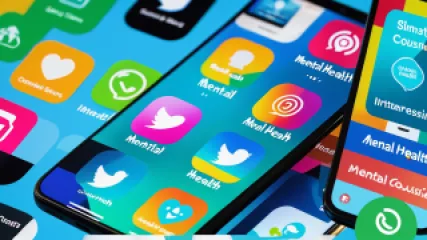The Ultimate Guide to Finding Mental Health Support Online
Mental health is a crucial aspect of overall well-being, and seeking support for mental health concerns is essential. In today's digital age, finding mental health support online has become increasingly popular and accessible. With the rise of technology, there are numerous mental health apps, virtual counseling services, and emotional well-being resources available at our fingertips. This ultimate guide aims to provide you with a comprehensive overview of finding mental health support online and help you navigate the vast landscape of mental health resources.
The Importance of Mental Health Support
Before we dive into the world of mental health apps and online resources, it's crucial to understand the importance of seeking support for your mental health. Mental health affects every aspect of our lives, from our relationships and work performance to our physical health and overall happiness. However, many individuals struggle with mental health issues in silence, and the stigma surrounding mental health often prevents people from seeking the help they need.
By accessing mental health support, individuals can gain valuable tools and resources to manage their mental health effectively. It can provide a safe space to express emotions, learn coping mechanisms, and develop strategies to navigate life's challenges. Whether you are experiencing anxiety, depression, stress, or any other mental health concern, seeking support is a proactive step towards improving your well-being.
The Rise of Mental Health Apps
In recent years, mental health apps have gained significant popularity as a convenient and accessible form of support. These apps offer a wide range of features, including guided meditations, mood tracking, journaling, cognitive behavioral therapy exercises, and more. With just a few taps on your smartphone, you can access a wealth of mental health resources at any time.
One of the key benefits of mental health apps is their ability to provide personalized and self-paced support. They allow users to tailor their experience based on their specific needs and preferences. Additionally, many mental health apps offer interactive features, such as chatbots or virtual counselors, which can provide immediate support and guidance.
Key Features to Look for in Mental Health Apps
When exploring mental health apps, it's essential to consider your individual requirements and goals. Here are some key features to look for:
- Mood tracking: The ability to monitor and analyze your mood patterns over time can provide valuable insights into your mental well-being.
- Guided meditations: Meditation has been shown to reduce stress and improve mental health. Look for apps that offer a variety of guided meditation sessions to suit your needs.
- Cognitive behavioral therapy (CBT) exercises: CBT is an evidence-based therapy technique that helps individuals identify and change negative thought patterns. Apps that offer CBT exercises can be beneficial for managing anxiety and depression.
- Journaling: Writing down your thoughts and emotions can be a therapeutic practice. Look for apps that provide a digital journaling feature.
- Community support: Some apps offer a community feature where users can connect with others who are experiencing similar challenges. This can provide a sense of belonging and support.
Virtual Counseling Services
In addition to mental health apps, virtual counseling services have become increasingly popular for individuals seeking professional support. Virtual counseling allows individuals to connect with licensed therapists and counselors remotely through video calls, phone calls, or messaging platforms.
This form of counseling offers several advantages, including convenience, accessibility, and affordability. Individuals can schedule appointments at their convenience and access counseling services from the comfort of their own homes. Virtual counseling services also eliminate geographical barriers, allowing individuals to connect with therapists who may not be available in their local area.
Choosing the Right Virtual Counseling Service
When selecting a virtual counseling service, consider the following factors:
- Licensing and credentials: Ensure that the counselors or therapists are licensed and qualified to provide mental health support.
- Specialties: Different counselors have expertise in various areas. Consider your specific needs and find a counselor who specializes in addressing those concerns.
- Cost and insurance coverage: Determine the cost of sessions and whether your insurance covers virtual counseling services.
- Communication methods: Understand the communication methods offered by the virtual counseling service, such as video calls, phone calls, or messaging platforms.
- Reviews and testimonials: Read reviews and testimonials from previous clients to gauge the quality of the virtual counseling service.
Exploring Online Mental Health Resources
Besides mental health apps and virtual counseling services, there are numerous online resources available to support your mental well-being. These resources range from informative websites and educational videos to online support groups and forums.
Here are some types of online mental health resources to explore:
- Informational websites: Websites like the National Institute of Mental Health (NIMH) and reputable mental health organizations provide comprehensive information on various mental health conditions, treatment options, and self-help strategies.
- Educational videos and podcasts: Many mental health professionals and organizations create videos and podcasts that offer valuable insights, tips, and advice on managing mental health.
- Online support groups: Joining online support groups can provide a sense of community and connection with others who are going through similar experiences. These groups often have moderators or mental health professionals who facilitate discussions.
- Forums and discussion boards: Participating in online forums and discussion boards allows individuals to ask questions, seek advice, and share their own experiences in a supportive online community.
Conclusion
As we navigate the digital age, finding mental health support online has become increasingly accessible and convenient. Mental health apps, virtual counseling services, and online resources offer a wide range of tools and support for individuals seeking help with their mental well-being. By exploring these options and taking advantage of the available resources, you can prioritize your mental health and embark on a journey of self-discovery and healing.
Sources:
- National Institute of Mental Health (NIMH). Retrieved from https://www.nimh.nih.gov/
- American Psychological Association (APA). Retrieved from https://www.apa.org/
- Mayo Clinic. Retrieved from https://www.mayoclinic.org/






